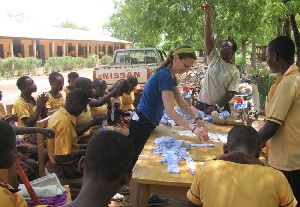Adolescent girls in basic schools who could have stayed out of school as a result of poor menstruation management in deprived Sekyere Afram Plains District are being assisted with free sanitary pads to enable them stay in classrooms.
Education authorities say several girls who have reached their adolescence spend at least one month every term or three months in a year away from the classrooms because of poor management of menstruation.
But thanks to EPF Educational Empowerment Initiative, about 270 pupils will be supplied with free sanitary pads in the next six months to keep them in the classrooms.
Education authorities hope the situation will improve with the implementation of the new program that will help relieve school girls of the burden on how to manage their menstrual periods.
As part of a program dubbed ‘Always Keeping Girls in School’, over 1000 new adolescent girls nationwide are being supported with free education on how to manage their menstrual periods whilst receiving free sanitary wares.
New adolescent girls in basic schools have been taken through reproductive health education, and also provide them with quality feminine hygienic products to help them remain in schools.
Deputy District Director of Education for Sekyere Afram Plains, Mark Adatekey says new adolescents in the area have over the years been left to battle challenges associated with menstruation.
“The people here are peasant farmers; some families can’t afford that for their girl child so that becomes critical. The mother doesn’t use a pad and she doesn’t see why she should buy a pad for the child. But the child goes to school and that’s the critical point. And so that makes the child unwilling to go to school because of the embarrassment.”
President and founder of EPF Educational Empowerment Initiative, a World of Children Youth honoree Ms Winifred Kyei Selby reveal improper management of a woman’s menstrual period could affect her reproductive life.
“Girls who cannot afford pads miss approximately 5 days of school a month, which amounts to 60 missed schools a year. There are many aspects that link girl’s attendance to their menstrual cycles. The lack of affordable sanitary products for girls and young women keeps them a disadvantaged in terms of education when they are young and prevents their mobility and productivity as young women”
Meanwhile, Co-Founder of the World of Children Award in US, Dr. Harry Leibowitz is promising more support for the African girl-child as the pupils of Dagomba benefit from biofil- toilet facility for girls in local basic schools.
Regional News of Saturday, 2 July 2016
Source: Nhyira FM

















